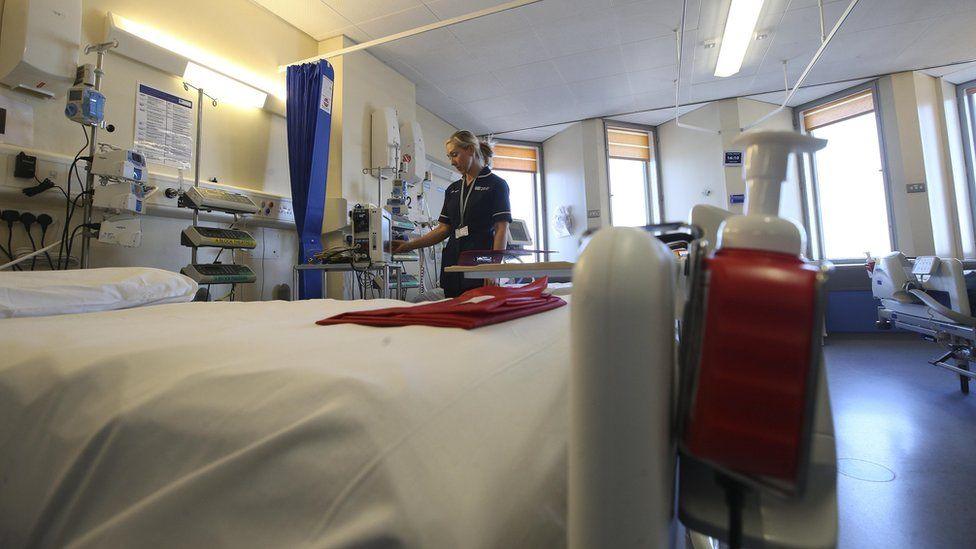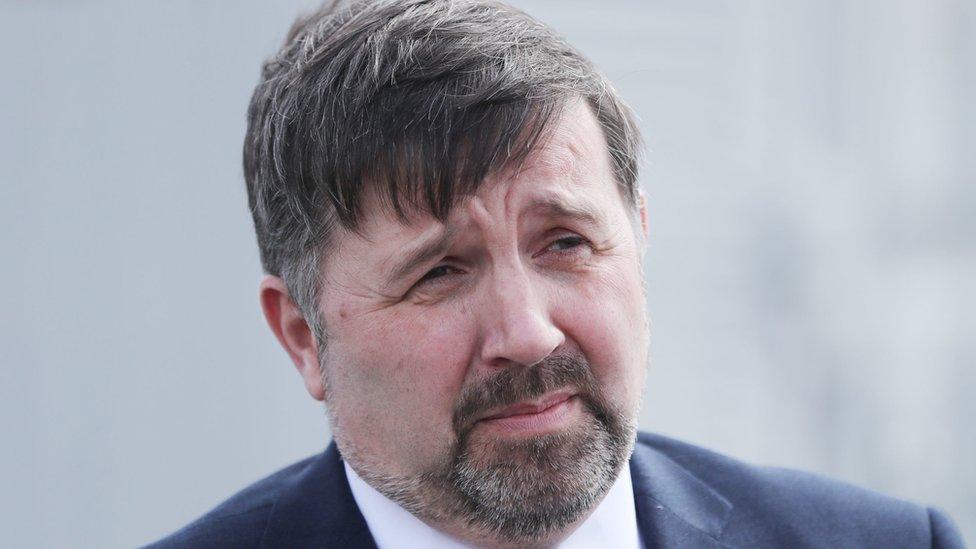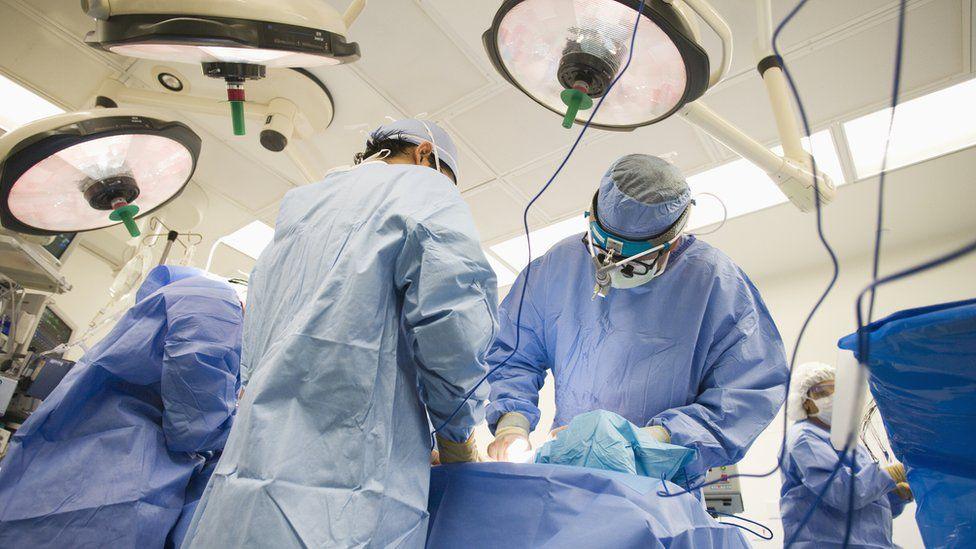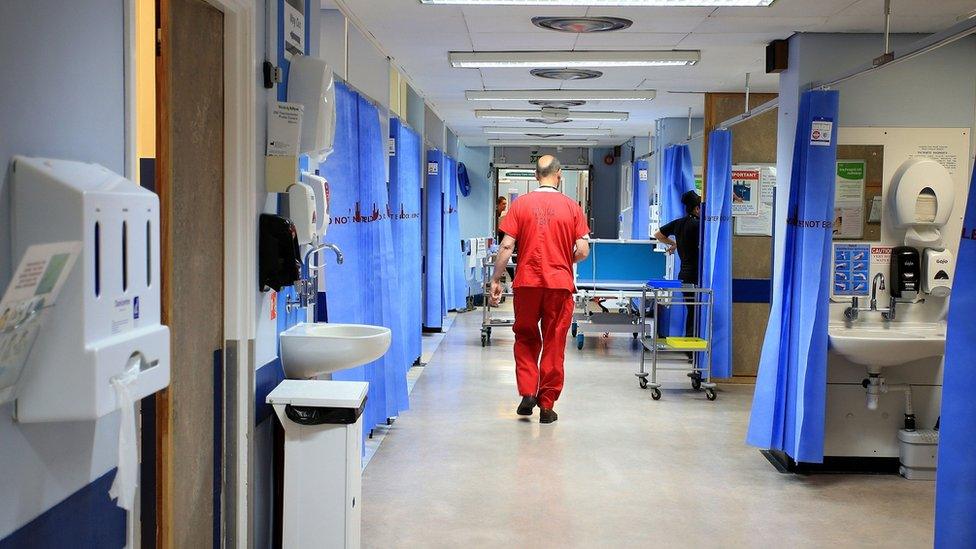Cancer: New three-year plan after all waiting targets are missed
- Published

All targets for Northern Ireland's cancer waiting times were missed during the first quarter of 2021, the latest figures show.
In March, 33% of breast cancer patients were seen within 14 days; the target is that all urgent breast cancer referrals should be seen within that time.
Stormont is expected to divert more than £30m to tackling waiting lists.
Health Minister Robin Swann said the pandemic has had a "devastating impact" on health services in NI and abroad.
Finance Minister Conor Murphy is to present details of the funding at Thursday's executive meeting.
Meanwhile, Mr Swann has published a three-year plan for rebuilding cancer care services.
He has admitted that waiting times are "entirely unacceptable."
"This recovery plan sets out the immediate steps needed to begin repairing the damage and building better services for the future," he said.
'Consistently missed'
The latest cancer waiting times figures, external show that more than half of patients who received urgent cancer referrals from GPs in the first quarter of this year did not start treatment on time.
The ministerial target says that at least 95% in this category of patients should begin their first treatment for cancer within 62 days of an urgent referral.
But this 62-day target was consistently missed for most patients - with only 44.7% beginning cancer treatment on time during the Covid-19 surge in January 2021, according to Department of Health statistics.
That figure rose to 45.1% in February and increased to 49.2% by March, but still means that more than half of new cancer patients did not receive treatment on time.
During the month of March this year 1,530 patients were seen by a breast cancer specialist for a first assessment, following an urgent referral for suspect breast cancer.
That was 43% more than the 1,069 urgent cases seen in March 2020.
All other waiting time targets for cancer treatment were missed.
The minister said "restoring and stabilising" cancer services was a priority for the Department of Health.
"Similar to countries right across the world, the Covid-19 pandemic has had a devastating impact on health and social care services in Northern Ireland," said Mr Swann.
"Despite the best efforts of the HSC system and clinicians to protect the most important services, unfortunately it wasn't always possible."

Health Minister Robin Swann has already acknowledged patients have to wait too long for treatment
However, Mr Swann said "good progress" had already been made in some areas, adding that the health service was now "providing more breast screening sessions than we were before the pandemic".
But he acknowledged that cancer services have increasingly struggled to keep up with growing demand from patients.
The minister said Northern Ireland had "significant and entirely unacceptable waiting times and deeply embedded workforce challenges long before the pandemic".
Mr Swann's three-year plan focuses on the period between now and 2024, while his department finalises a longer-term plan - a 10-year cancer strategy for Northern Ireland.
The Department of Health said the proposals will have two key principles - the first of which is that cancer care will be delivered "on the basis of clinical priority rather than order of waiting".
The second principle is "equality of waiting across Northern Ireland" so that each cancer patient has the same access to treatment, no matter where they live.
Objectives listed in the cancer recovery plan include increasing cancer screening capacity, to address backlogs which built up as a consequence of the pandemic.
It also envisages investment in new cancer services which would be more "resilient" to any future Covid-19 surges.
'Too long for treatment'
Northern Ireland has the worst waiting times of any UK region, with problems exacerbated by the restructuring of the health service to deal with the Covid-19 pandemic.
In recent weeks it emerged that some people are waiting seven years for medical procedures in Northern Ireland.
The latest hospital waiting list figures, from January to March 2021, show:
More than 335,000 people were waiting for a first consultant-led appointment
More than 189,000 people had been waiting for a first outpatient appointment for longer than a year
The departmental target is that at least half of all patients should wait no longer than nine weeks for a first appointment and no-one should wait longer than 52 weeks.
At the time, Mr Swann said many people were waiting "too long for treatment" and added that size of Northern Ireland's waiting lists was "undermining" the principle of a free health service.
Related topics
- Published2 June 2021

- Published10 June 2021

- Published27 May 2021

- Published13 April 2021
